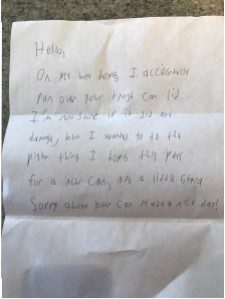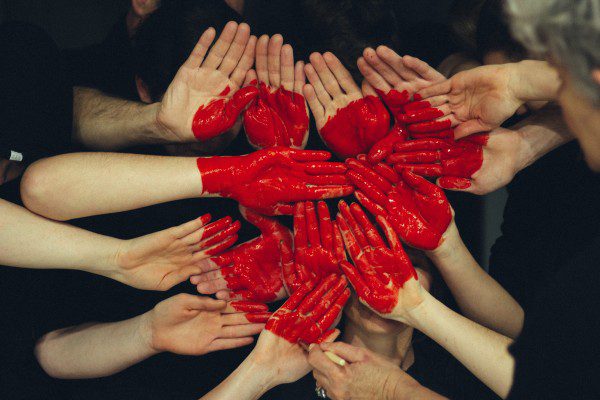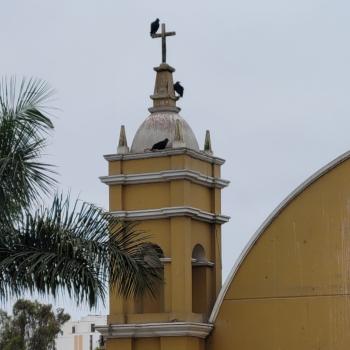Imagine opening your mailbox one day and finding an unmarked, sealed plain white envelope inside—containing an unsigned note and $250 in cash. Here’s the story of an act of generosity that may surprise you:
Good friends of my family live in a rural section of Maryland, where the houses are few and far between and the roads are narrow. On a windy, trash collection day, one friend (Matt) went to bring in the garbage can only to find the lid had been blown into the center of the road—and had been run over by a car or truck.
While the heavy plastic lid was bent in the middle, it was still usable. Matt wasn’t overly concerned and brought the trash can back to its resting place on the side of the house. Which should have been the end of the story but wasn’t.
 A few days later, Matt went to retrieve his mail and found a plain white envelope, with no name or address on it, inside his box. He opened it to find the note you see pictured here and $250 in cash. Since it’s a little hard to read, I’ll repeat its contents below:
A few days later, Matt went to retrieve his mail and found a plain white envelope, with no name or address on it, inside his box. He opened it to find the note you see pictured here and $250 in cash. Since it’s a little hard to read, I’ll repeat its contents below:
Hello,
On my way home, I accidentally ran over your trash can lid. I’m not sure if it did any damage, but I wanted to do the right thing. I hope this pays for a new can, (indecipherable). Sorry about your can. Have a nice day!
Now while it was a good trash can, it’s value was close t0 $50. So why leave $250 in restitution? Maybe the extra money was for any perceived inconvenience that was caused. Or perhaps the reason 250 was left transcends the rational dollar-value of the trash can—and was a gesture of good will. Either way, it’s an act of generosity that reminds me of the following adage:
For it is in giving that we receive.
One of my spiritual mentors, John Templeton, believed that “we receive freely when we give freely.” It’s an idea mirrored in the 13th century Francis of Assisi quote above. Templeton wrote that abundance and prosperity need an inflow and an outflow, “just like any body of water, if it is to remain fresh, clean and moving.” (And interestingly the human body is comprised of 60% water.) He wonders:
Do we keep the energy of abundance flowing by circulating part of what we have received by giving to others? Then, miracle of miracles, the more we give away, the more we have! This is the joy of allowing the energy of the universe to flow uninterrupted through us.
Templeton’s notion is that to experience the joy of receiving, we must experience the joy of giving. We give and we receive. It’s a cosmic quid pro quo. The only caveat is that we must give willingly, while expecting nothing in return. Which, in our busy lives, is often easier said than done. The life blogger Seth Godin sums up the issue this way:
Generosity takes effort. It requires the space to take your mind off your own problems long enough to see someone else’s. It requires the confidence to share when a big part of you wants to hoard. And it requires the emotional labor of empathy.
Think about it. The person who ran over the trash can lid could have continued on their way. Certainly, no one would have been the wiser. But he or she decided to come back. And not just with a note of apology, but with a gift that far exceeded the value of any damage done.
It’s enough to, at least momentarily, restore your faith in humanity.


















